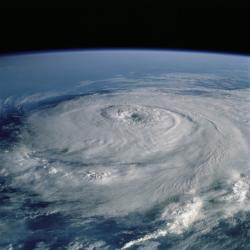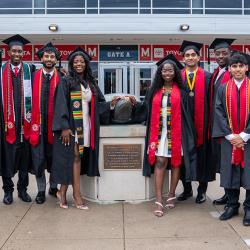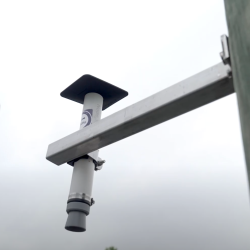UMD Atmospheric & Oceanic Science Major Olivia Griffith Awarded 2024 Hollings Scholarship
Awardees receive up to $19,000 and a paid summer internship with the National Oceanic and Atmospheric Administration.
When University of Maryland undergraduate Olivia Griffith opened her email and saw that she received a 2024 Ernest F. Hollings Undergraduate Scholarship, she had to do a double take.
“It was April 1, so I kind of thought it was a prank,” she said. “I did not think that it was happening.”
This was no trick, though. Griffith, who will be a junior atmospheric and oceanic science (AOSC) major in the fall, is one of only two students in the state of Maryland to receive this year’s Hollings Scholarship from the National Oceanic and Atmospheric Administration (NOAA). She and 129 other scholarship recipients across the United States will receive up to $19,000 over two years, plus professional development opportunities and a paid summer internship at any NOAA facility nationwide.

Griffith hasn’t selected her Hollings internship for summer 2025 just yet, but she wants to pick a topic related to research she’ll be conducting at NOAA’s Center for Weather and Climate Prediction in College Park, Maryland, for a different two-year internship.
“We’re working on tropical storm transitions to help mariners create a better escape route,” Griffith said of that research, which is in the early stages.
Griffith has been interested in meteorology and the environment for a long time. While growing up in Philadelphia, she regularly watched the local weather reports. She also developed a passion for sustainability after reading about the waste generated by “fast fashion” brands, prompting her to learn how to sew her own clothes.
At UMD, Griffith started out as an environmental science and policy major but switched to AOSC after taking lecturer Jeff Henrikson’s AOSC 123: “Causes and Implications of Global Change” class.
“He got me interested more in the science-y side of environmental science rather than policy,” Griffith said. “Then I took his intro to climate and weather class in the spring and he was the reason why I switched to the AOSC department.”
With such varied interests, Griffith is also pursuing a remote sensing of environmental change minor in the Department of Geographical Sciences. One of her classes this summer, GEOG418: “Field and Laboratory Techniques in Environmental Science,” will include camping for 10 days in West Virginia’s Monongahela National Forest, where she and her classmates will learn about hydrology and drone GIS (geographic information systems).
Last winter, Griffith’s sense of adventure took her to Vietnam for a UMD study abroad experience focused on climate-resilient development in the Southeast Asian country’s Mekong Delta region. Her favorite part was getting an up-close view of Vietnam’s mangrove forests, which help to sequester carbon and protect local communities by acting as a natural buffer against high winds and storms.
“We got to take a boat through all the rivers where the mangroves line the banks, and we were able to see a government project where they're planting mangrove saplings to help create a better coastline as sea levels rise,” Griffith said. “We learned about how mangroves are being affected by climate change and how they can help coat the coastline.”
Griffith also credits her experiences in UMD’s Scholars Program for helping her learn new skills. As a sophomore, she served as a peer mentor with the Environment, Technology and Economy Scholars Program.
“It was really rewarding,” she said. “We had the opportunity to mentor five freshmen and we got close with them. We guided them and helped them choose their yearlong project, which is usually an internship.”
As an active member of UMD’s chapter of Epsilon Eta (EH), a professional fraternity focused on environmental science and sustainability, Griffith will serve as the co-director of recruitment this fall. During her summers away from campus, she also tutors elementary school students in Philadelphia through Mathnasium, a math learning center.
Though she’s still exploring her future plans, Griffith thinks she’d like to pursue a career related to weather forecasting. And with two NOAA internships to look forward to, she hopes to apply her forecasting, math and GIS skills and pick up some new skills along the way, like coding.
“This scholarship is an amazing opportunity for students to take the next step in our careers,” Griffith said. “As for the internship, I am most excited about having the opportunity to live in a new place and work alongside some of the best meteorologists in the country. I cannot wait to see what I will learn from them.”







